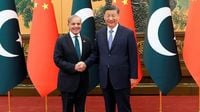In a significant development following the deadly terror attack in Pahalgam, Kashmir, that claimed 26 lives, China has voiced its support for Pakistan's demand for an impartial investigation. The attack, which occurred on April 22, was attributed to the terrorist group The Resistance Front, a proxy for Pakistan-based Lashkar-e-Taiba, prompting heightened tensions between India and Pakistan.
Chinese Foreign Minister Wang Yi communicated with Pakistan’s Deputy Prime Minister and Foreign Minister Ishaq Dar on Sunday, April 27, 2025, emphasizing the need for restraint from both nations. Wang stated, "China supports the prompt initiation of an impartial investigation, as the conflict serves neither the fundamental interests of India and Pakistan nor regional peace and stability," according to a report by the Global Times.
This phone call came on the heels of Prime Minister Shehbaz Sharif's assertion that Pakistan is open to any neutral, transparent, and credible investigation into the attack. In his remarks, Sharif described the Pahalgam incident as a continuation of a “perpetual blame game” that needs to cease. He stated, "Continuing with its role as a responsible country, Pakistan is open to participating in any neutral, transparent, and credible investigation."
During the conversation, Dar briefed Wang on the escalating tensions following the attack, reiterating Pakistan's commitment to combating terrorism and its opposition to actions that could escalate the situation. He stressed that Pakistan is dedicated to managing the crisis maturely and will maintain open lines of communication with both China and the international community.
Wang’s comments highlighted China's understanding of Pakistan's "legitimate security concerns" and its commitment to supporting Islamabad in safeguarding its sovereignty and security interests. He remarked, "The fight against terrorism constitutes a shared responsibility of all nations, and China consistently supports Pakistan’s firm counter-terrorism actions."
The attack has led to a series of punitive measures from India, which has accused Pakistan of harboring terrorists responsible for the violence. India has communicated to foreign governments that it possesses a combination of technical intelligence and credible inputs linking Pakistan to the attackers, who killed 25 Indians and one Nepalese citizen.
In a recent interview, Pakistani Defence Minister Khawaja Asif suggested that countries like Russia or China could play a constructive role in investigating the claims surrounding the attack. He stated, “I think Russia or China or even Western countries can play a very, very positive role in this crisis and they can even set up an investigation team that should be assigned this job to investigate whether India or Modi is lying or telling the truth.”
China's support for Pakistan comes amid rising tensions, with India taking drastic steps, including suspending the Indus Waters Treaty, which governs water-sharing between the two nations, and closing the Wagah-Attari border. These measures have incited fierce backlash from Pakistan, which has warned that such actions could be perceived as acts of war.
In response to India's actions, Pakistan has closed its airspace to Indian airlines and halted all trade with India. The National Investigation Agency (NIA) of India has taken over the investigation into the Pahalgam attack, sealing off the site to preserve evidence as they pursue leads.
Wang Yi's remarks reflect a broader concern for regional stability, as he urged both India and Pakistan to exercise restraint and engage in dialogue. He stated, "Both sides should meet each other halfway and promote the cooling of the situation," underscoring the importance of avoiding escalation that could lead to armed conflict.
As the situation continues to evolve, both nations are under pressure to navigate their responses carefully. The international community is closely watching the developments, with China positioning itself as a key ally for Pakistan. The ongoing dialogue between Wang and Dar is expected to play a crucial role in shaping the future of India-Pakistan relations.
In conclusion, the Pahalgam attack has not only claimed lives but has also reignited longstanding tensions between India and Pakistan, highlighting the delicate balance of power in the region. As calls for an impartial investigation grow, the world watches to see how both nations will respond to the challenges ahead.






